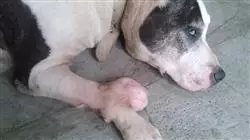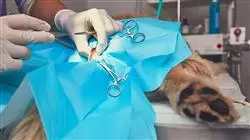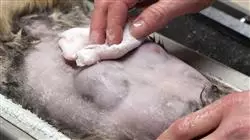University certificate
The world's largest faculty of veterinary medicine”
Introduction to the Program
Nuestro innovador concepto de telepráctica te dará la oportunidad de aprender mediante una experiencia inmersiva, que te proporcionará una integración más rápida y una visión mucho más realista de los contenidos: Learning from an Expert"

La edad de los pacientes que se reciben en la consulta veterinaria es cada vez más alta por lo que con mayor frecuencia hay casos de pacientes con cáncer.
Este programa intensivo recopila las diferentes enfermedades oncológicas que afectan a los pequeños animales. Aborda el desarrollo de los diferentes tumores que afectan a la especie canina y felina, centrándose en el abordaje diagnóstico y terapéutico, en el que se incluyen los tratamientos más novedosos.
La oncología de pequeños animales es una subespecialidad de la medicina interna con un gran desarrollo en las últimas décadas. Los docentes de este programa están a la vanguardia de las últimas técnicas diagnósticas y tratamiento de las enfermedades oncológicas en pequeños animales. Por su capacitación especializada han desarrollado un programa útil, práctico y adaptado a la realidad actual, una realidad cada vez más demandante y especializada.
Todos los docentes de esta Postgraduate diploma son clínicos y/o profesores universitarios con experiencia en capacitación tanto en el grado como en programas de Postgrado. Los docentes que participan están especializados en diferentes áreas implicadas en la oncología de pequeños animales como oncólogos clínicos, cirujanos oncológicos, tadiólogos y anatomopatólogos. Se pretende así, ofrecer un programa con enfoque de la oncología con un abordaje multidisciplinar.
Este programa especializa al clínico generalista en oncología veterinaria, en un área cada vez más solicitada, en parte por su frecuencia, en parte por la necesidad de la especialización que esta área demanda.
En todos los módulos se compila la experiencia de los autores, sin olvidar la rigurosidad científica y las actualizaciones más importantes, basadas en la evidencia. Desarrolla las enfermedades, los protocolos de actuación y tiene en cuenta el abordaje integral del paciente, considerando la enfermedad, el paciente y el propietario.
Asimismo, en el programa se aporta numeroso material multimedia: fotos, vídeos, esquemas, tan importantes en una especialidad cómo también las técnicas de imagen y la cirugía.
Al tratarse de un programa online, el alumno no está condicionado por horarios fijos, ni tiene necesidad de trasladarse a otro lugar físico. Puede acceder a todos los contenidos en cualquier momento del día, de manera que puede realizarse conciliando la vida laboral o personal con la académica.
Conviértete en uno de los profesionales más demandados del momento: capacitate en Nervous System, Cardiac, Genitourinary and Musculoskeletal Tumors in Small Animals con este completísimo programa online”
Esta Postgraduate diploma en Nervous System, Cardiac, Genitourinary and Musculoskeletal Tumors in Small Animals contiene el programa científico más completo y actualizado del mercado. Sus características más destacadas son:
- Última tecnología en software de enseñanza online
- Sistema docente intensamente visual, apoyado en contenidos gráficos y esquemáticos de fácil asimilación y comprensión
- Desarrollo de casos prácticos presentados por expertos en activo
- Sistemas de vídeo interactivo de última generación
- Enseñanza apoyada en la telepráctica
- Sistemas de actualización y reciclaje permanente
- Aprendizaje autoregulable: total compatibilidad con otras ocupaciones
- Ejercicios prácticos de autoevaluación y constatación de aprendizaje
- Grupos de apoyo y sinergias educativas: preguntas al experto, foros de discusión y conocimiento
- Comunicación con el docente y trabajos de reflexión individual
- Disponibilidad de los contenidos desde cualquier dispositivo fijo o portátil con conexión a internet
- Bancos de documentación complementaria disponible permanentemente, incluso después del programa
Consigue una completa y adecuada habilitación en Nervous System, Cardiac, Genitourinary and Musculoskeletal Tumors in Small Animals con este programa de alta eficacia educativa y abre nuevos caminos a tu progreso profesional"
El personal docente está integrado por profesionales de diferentes ámbitos relacionados con esta especialidad. De esta manera, TECH se asegura de ofrecer el objetivo de actualización educativa que pretende. Un cuadro multidisciplinar de profesionales especializados y experimentados en diferentes entornos, que desarrollarán los conocimientos teóricos, de manera eficiente, pero, sobre todo, pondrán al servicio del programa los conocimientos prácticos derivados de su propia experiencia: una de las cualidades diferenciales de esta capacittación.
Este dominio de la materia se complementa con la eficacia del diseño metodológico de esta Postgraduate diploma en Nervous System, Cardiac, Genitourinary and Musculoskeletal Tumors in Small Animals. Elaborado por un equipo multidisciplinario de expertos en e-Learning integra los últimos avances en tecnología educativa. De esta manera, podrás estudiar con un elenco de herramientas multimedia cómodas y versátiles que le darán la operatividad que necesitas en su capacitación.
El diseño de este programa se centra en el Aprendizaje Basado en Problemas: un planteamiento que concibe el aprendizaje como un proceso eminentemente práctico. Para conseguirlo de forma remota, TECH usará la telepráctica: con la ayuda de un novedoso sistema de vídeo interactivo, y el Learning from an Expert el alumno podrá adquirir los conocimientos como si estuviese enfrentándose al supuesto que está aprendiendo en ese momento. Un concepto que le permitirá integrar y fijar el aprendizaje de una manera más realista y permanente.
Con un diseño metodológico que se apoya en técnicas de enseñanza contrastadas por su eficacia, este programa te llevará a través de diferentes abordajes docentes para permitirte aprender de forma dinámica y eficaz”

Contarás con la experiencia de profesionales expertos que aportarán al programa su experiencia en esta área de actuación, haciendo de esta capacitación una ocasión única de crecimiento profesional”
Syllabus
The contents of this program have been developed by the different experts on this course with a clear purpose: to ensure that our students acquire each and every one of the necessary skills to become true experts in this field.

A complete and well-structured program will take you to the highest standards of quality and success"
Module 1. Genitourinary Tumors. Nervous System Tumours
1.1. Female Reproductive System Tumors
1.1.1. Epidemiology
1.1.2. Diagnosis
1.1.3. Treatment
1.2. Male Reproductive System Tumors
1.2.1. Epidemiology
1.2.2. Diagnosis
1.2.3. Treatment
1.3. Urinary System Tumors (I)
1.3.1. Renal Tumors
1.3.2. Diagnosis
1.3.3. Treatment
1.4. Urinary System Tumors (II)
1.4.1. Urinary Bladder Tumors
1.4.2. Diagnosis
1.4.3. Treatment
1.5. Genitourinary Surgery (I)
1.5.1. General Principles of Reproductive System Surgery
1.5.2. Surgical Techniques in the Male Genital Tract
1.5.3. Surgical Techniques in the Female Genital Tract
1.6. Genitourinary Surgery (II)
1.6.1. Kidney Surgical Techniques
1.6.2. Ureter Surgical Techniques
1.6.3. Bladder Surgical Techniques
1.6.4. Urethra Surgical Techniques
1.7. Transmissible Venereal Tumor
1.7.1. Incidence and Pathology
1.7.2. Diagnosis
1.7.3. Treatment
1.8. Nervous System Tumors (I)
1.8.1. Brain Tumors
1.8.2. Diagnosis
1.1.3. Treatment
1.9. Nervous System Tumors (II)
1.9.1. Spinal Cord Tumors
1.9.2. Diagnosis
1.9.3. Treatment
1.10. Nervous System Surgery
1.10.1. Surgical Techniques for the Approach to Intracranial Tumors
1.10.2. Surgical Techniques for the Approach to Spinal Cord Tumors
1.10.3. Frequent Complications in Nervous System Surgery
Module 2. Hematopoietic Tumors
2.1. Hematopoietic System Tumors (I): Canine Lymphoma (I)
2.1.1. Etiology
2.1.2. Classification and Pathology
2.1.3. Clinical Signs
2.1.4. Diagnosis
2.1.5. Clinical Status
2.2. Hematopoietic System Tumors (II): Canine Lymphoma (II)
2.2.1. Multicentric Lymphoma Treatment
2.2.1.1. Re-Induction and Salvage Chemotherapy
2.2.1.2. Strategies to Improve Treatment Effectiveness
2.2.1.3. Immunotherapy and Other Treatments
2.3. Hematopoietic System Tumors (III): Canine Lymphoma (III)
2.3.1. Extranodal Lymphoma Treatment
2.3.2. Canine Lymphoma Prognosis
2.4. Hematopoietic System Tumors (IV): Canine Lymphoma (IV)
2.4.1. Lymphocytic Leukemia
2.4.2. Incidence, Etiology, Pathology and Classification
2.4.3. Clinical Signs and Diagnosis
2.4.4. Treatment
2.4.5. Prognosis
2.5. Hematopoietic System Tumors (V): Feline Lymphoma (I)
2.5.1. Incidence, Etiology and Pathology in Feline Lymphoma
2.5.2. Gastrointestinal / Dietary Lymphoma
2.6. Hematopoietic System Tumors (VI): Feline Lymphoma (II)
2.6.1. Peripheral Lymph Node Lymphoma
2.6.1.1. Mediastinal Lymphoma
2.6.2. Extranodal Lymphoma
2.6.2.1. Nasal Lymphoma
2.6.2.2. Renal Lymphoma
2.6.2.3. Central Nervous System Lymphoma
2.6.2.4. Cutaneous Lymphoma
2.6.2.5. Subcutaneous Lymphoma
2.6.2.6. Laryngeal Lymphoma
2.6.2.7. Ocular Lymphoma
2.6.2.8. Felines Lymphoma Prognosis
2.7. Hematopoietic System Tumors (VII): Feline Lymphoma (III)
2.7.1. Feline Leukemia, Myeloproliferative Disorders and Myelodysplasia
2.8. Hematopoietic System Tumors (VIII)
2.8.1. Canine Acute Myeloid Leukemia, Myeloproliferative Neoplasms, and Myelodysplasia
2.8.1.1. Incidence, Risk Factors
2.8.1.2. Pathology
2.8.1.3. Acute Myeloid Leukemia
2.8.2. Myeloproliferative Neoplasms
2.8.2.1. Polycythemia Vera
2.8.2.2. Chronic Myelogenous Leukemia
2.8.2.2.1. Eosinophilic and Basophilic Leukemia
2.8.2.2.2. Essential Thrombocythemia/Primary Thrombocytosis
2.9. Other Bone Marrow Disorders
2.9.1. Myelofibrosis
2.9.2. Myelodysplastic Syndromes
2.10. Hematopoietic System Tumors (IX): Plasma Cell Tumors
2.10.1. Multiple Myeloma
2.10.2. Solitary and Extramedullary Plasmacytic Tumors
2.10.3. Canine Histiocytic Disease: Feline Histiocytic Disease
2.10.4. Canine Histiocytic Disease
2.10.4.1. Cutaneous Histiocytoma
2.10.4.2. Cutaneous Langerhans Cell Histiocytosis
2.10.4.3. Reactive Histiocytosis
2.10.5. Histiocytic Sarcoma
2.10.6. Hemophagocytic Histiocytic Sarcoma
2.10.7. Feline Histiocytic Disease
2.10.8. Feline Histiocytic Sarcoma
2.10.9. Progressive Feline Histiocytosis
2.10.10. Pulmonary Langerhans Cell Histiocytosis
Module 3. Hemangiosarcoma. Thymoma. Cardiac Tumors. Musculoskeletal Tumors
3.1. Hemangiosarcoma (I)
3.1.1. Incidence and Risk Factors
3.1.2. Etiology
3.1.3. Diagnosis
3.2. Hemangiosarcoma (II)
3.2.1. Treatment
3.2.2. Prognosis
3.3. Spleen Surgery
3.3.1. Spleen Surgery Techniques
3.4. Thymoma
3.4.1. Diagnosis
3.4.2. Treatment
3.5. Cardiac Tumors
3.5.1. Diagnosis
3.5.2. Treatment
3.6. Thoracic Surgery (I)
3.6.1. Anatomy
3.6.2. Particularities of Thoracic Surgery
3.6.3. Thoracic Cavity Approaches
3.7. Thoracic Surgery (II)
3.7.1. Pericardiocentesis
3.7.2. Pericardiectomy
3.8. Musculoskeletal Tumors (I)
3.8.1. Osteosarcoma
3.8.2. Incidence and Risk Factors
3.8.3. Etiology
3.8.4. Diagnosis
3.8.5. Treatment
3.9. Musculoskeletal Tumors (II)
3.9.1. Other Bone Tumors
3.9.2. Feline Bone Tumors
3.10. Musculoskeletal Surgery
3.10.1. Biopsy Technique
3.10.2. Surgical Technique for Amputations

This program will allow you to advance in your career comfortably"
Postgraduate Diploma in Nervous System, Cardiac, Genitourinary and Musculoskeletal Tumors in Small Animals
TECH Global University presents the Postgraduate Diploma in Nervous System, Cardiac, Genitourinary and Musculoskeletal Tumors in Small Animals, a unique opportunity to expand your knowledge in the veterinary field. Our online classes will allow you to acquire the skills necessary for the diagnosis and treatment of tumors in small animals, giving you a competitive advantage in your veterinary practice. Online classes at TECH Global University offer numerous benefits. You will be able to access your education from anywhere and at any time that is convenient for you, without interruptions in your veterinary work. In our postgraduate course, you will gain in-depth knowledge of the tumors that affect these systems in companion animals; you will learn advanced diagnostic imaging techniques, pathology and specific oncological treatment for each type of tumor; you will understand the importance of early detection and a multidisciplinary approach in the management of tumors in small animals. You will also learn to work as a team with other animal health professionals, such as radiologists, oncologists and surgeons, to provide comprehensive and personalized care to your patients.
Become a specialist in the treatment of small animal tumors
Our educational approach is based on the combination of theory and practice, allowing you to apply the knowledge acquired in real clinical cases. You will be supported by experts in veterinary oncology, who will guide you and share their experience to maximize your learning and professional development. At TECH, we are proud to offer a Postgraduate Diploma that will allow you to stand out as a veterinarian and provide quality care to your patients. Don't miss the opportunity to grow professionally with our Postgraduate Diploma in Nervous System, Cardiac, Genitourinary and Musculoskeletal Tumors in Small Animals! Get ready to be a reference in the fight against animal tumors and make a difference in your patients' lives.







